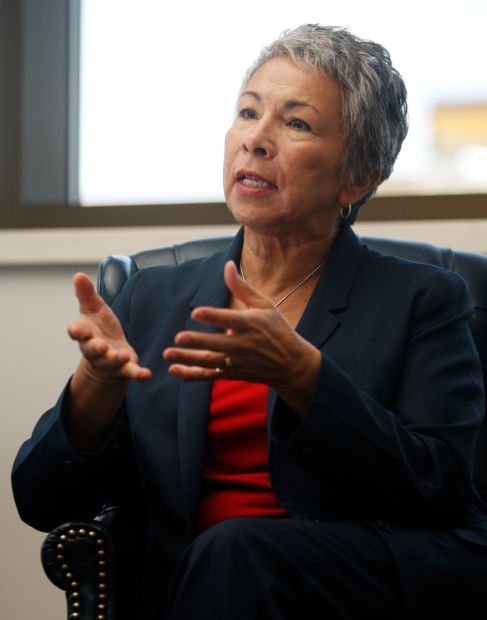
The Billings Area Indian Health Service can’t offer a full range of services, its new interim director says. But the services it does provide must be up to snuff.
Acting Director Dorothy A. Dupree acknowledged inadequacies in the Billings area office during an interview with the Billings Gazette and outlined steps she’s taking to put quality care at the forefront.
“We’re at the beginning of a lot of learning,” she said.
Dupree, a veteran of the IHS with more than 20 years experience in Indian health care, was chosen to step in until a replacement is found for former director Anna Whiting-Sorrell, who resigned in April after fewer than 18 months, citing the great challenges facing the agency.
Whiting-Sorrell’s resignation put a spotlight back on the beleaguered office and was met with calls from tribal leaders and Montana congressmen to again investigate its operations.
During a U.S. Senate field hearing in Billings, patients and tribal leaders criticized IHS for what they described as pervasive dysfunction and substandard care at IHS hospitals.
“It’s not quality health care. It’s whatever care,” one patient told The Gazette in May.
A congressional watchdog group will soon launch an investigation of the Billings-area agency, with a report expected to be completed by the end of the year, Sen. Jon Tester, D-Mont., said.
Dupree, who started in June, said improving the agency will take time, but she thinks it can be done. During her interim tenure, she’s trying to put in place a “skeleton of quality” that will allow Billings Area IHS hospitals and clinics to meet health care standards and can carry through to the next director.
“In a system, you know what needs to be in place. We do have some elements here that are not in place,” Dupree said.
A member of the Assiniboine and Sioux tribes, Dupree grew up on the Fort Peck Reservation and graduated from Poplar High School. She’s soft-spoken but firm, a veteran administrator who thinks in the language of federal systems, yet ties her interest in IHS to a simple childhood desire to help fellow Indians.
She was appointed to fill the void in Billings in part because of her work in improving care delivered by the IHS regional office in Phoenix, Ariz., where she is expected to return as director.
She also has been director at IHS offices in Albuquerque, N.M., and Tucson, Ariz., and spent a decade as a policy adviser for the Centers for Medicare and Medicaid Services. There, Dupree established a tribal affairs office within CMS.
In Billings, one area needing attention is hospital procedures for handling patient complaints, which Dupree said have not been consistent. She also said hospitals didn’t have staff committees dedicated to overseeing quality, which is considered an industry standard.
Both are being put in place now, Dupree said, and she wants the Billings office to track complaints over time so it can better identify areas for improvement. IHS officials shouldn’t need auditors to let them know where problems are, Dupree said.
Some tribal leaders have criticized the Billings administrative office for not being patient-focused, but Dupree thinks the problem is due to lack of education, not apathy. And she said it’s not unique to Billings.
“What I’ve seen here is lack of knowledge, first, about what hospital system requirements are,” she said. “That was also prevalent in Tucson. It was prevalent in Phoenix.”
“It’s difficult to recruit for individuals who have that level of experience and that level of detail, so we train for it,” she added.
Staff recently traveled to Phoenix to receive training through a hospital consortium Dupree established there that’s intended to share best practices across IHS hospitals. Webinars and onsite training opportunities in Billings will be ongoing, she said.
“Some people are thirsty for that and are very responsive to that. Those resistant to change will self-select out, or they will not perform” and will be dealt with accordingly, Dupree said.
Administrative bloat isn’t the cause of IHS troubles, she said. The amount budgeted for “purely operational staff” in the Billings area is about 13 percent — not more than half, as has been claimed by some tribal leaders.
But IHS remains “extremely short” on provider staffing, due to difficulties in recruiting and funding that’s leaner than other federal health care agencies. It’s important for the tribes to understand the agency’s limitations, Dupree said.
While IHS is able to provide primary care, its ability to employ specialists will continue to diminish unless its funding is increased to keep pace with inflating costs of health care, she said.
Funding for referrals doesn’t meet patient need, so cases are prioritized by severity, starting with “life or limb” situations. Some patients may need to apply for third-party insurance to receive certain specialized care, Dupree said, which doesn’t sit well with many tribal members, for whom health care was promised by federal treaty.
“The issue is we can’t provide all care, but what we can provide we have to provide well and make certain that we’re following the quality standards for that,” Dupree said.
Community meetings with tribes is one way to build understanding, become more responsive to patient needs and restore trust.
“It’s difficult, but it’s necessary,” she said.




